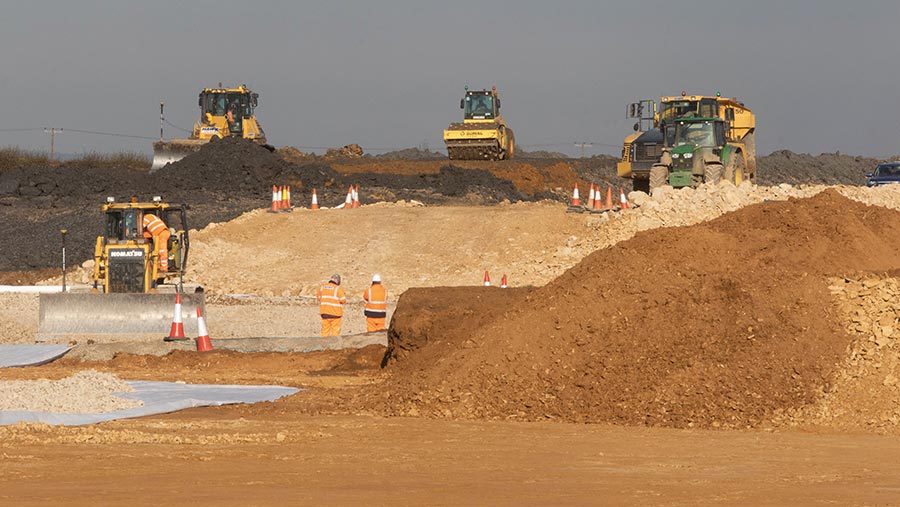Business Clinic: What can we do about compulsory purchase?
 © Tim Scrivener
© Tim Scrivener Whether you have a legal, tax, insurance, management or land issue, Farmers Weekly’s Business Clinic experts can help.
Mark Warnett, partner and head of compulsory purchase claimant services at Carter Jonas, advises a farmer facing the prospect of losing land to a road scheme through compulsory purchase.
See also: Compulsory purchase of farmland: Compensation explained
Q. I have just been informed that part of my farm will be affected by compulsory purchase for a new road. What are my rights and what should I do?
A. The government is rolling out a £27bn strategic road investment programme, promoted by Highways England.
In addition, there are county council road schemes, new railways, electricity lines, power stations and so on, so it’s inevitable that more and more farmers will have to deal with compulsory purchase.
Having had a road built through our family farm in Kent and acting for similarly affected clients every day, I can attest to the practical, emotional and financial challenges (and occasionally opportunities) involved.
Compulsory purchase is a labyrinth of law and procedure, but there are some practical steps that farmers and rural landowners can take.
First, you should set pragmatic objectives.
Every case is different, but generally it is far better to come to an agreement with an acquiring authority to avoid a loss, rather than suffering a loss and later seeking compensation.
For example, I have negotiated environmental management agreements, enabling farmers to retain land which would otherwise have been compulsorily purchased for environmental mitigation.
Land swaps have also been agreed with acquiring authorities in lieu of compensation.
Accommodation works can include acoustic fences, new tracks, drainage, rabbit fencing and many other practical solutions to lessen the impact of a new road or railway.
So, set pragmatic and achievable objectives and engage with the authority early – burying your head in the sand will sadly only limit your options.
Second, be aware that this will be a marathon, not a sprint.
The government often talks about speeding up infrastructure delivery but, in reality, these are complicated projects with demanding front-ended consultation rules, and the planning and consenting process alone takes years.
Acquiring authorities have exacting governance procedures and negotiations can be protracted. Patience, determination and persistence are key.
Third, from the absolute beginning, keep a thorough file of information.
This should document, among other things, your time spent dealing with the issue, including date, time spent, and activity undertaken.
It should also include photographs showing the condition of your property prior to any access by the acquiring authority and throughout the construction works.
There are many things that you can be compensated for aside from the loss of property – for example, your reasonably incurred time, crop damage and other costs consequential to the scheme, including those for professional advice.
However, without evidence that a loss or a cost was incurred, you won’t be able to substantiate a claim.
Get three quotes for any costs you incur due to the scheme, and keep quotes and invoices along with your own notes.
You and your adviser will be glad of them when submitting claim evidence months or even years down the line.
Fourth, know your rights.
Questions you will need answers to may include:
When does the acquiring authority have rights to access your property for surveys, and when do they need your agreement?
When can you require the authority to acquire your entire property?
When can you make representations about a scheme and on what basis?
What happens if you can’t agree compensation and what procedure should you follow?
Knowledge of the complex rules of compulsory purchase and practical experience are key. There are many finely balanced decisions where judgement is important.
So, I’m bound to say: instruct an experienced compulsory purchase specialist who can tell you your rights and advise you how to apply them in practice.
In addition, other than exceptional cases, acquiring authorities will need to go through a consenting process and demonstrate a compelling case in the public interest, as well as satisfying environmental, planning and many other elements of law, before they are granted compulsory purchase powers.
The golden rule is to engage constructively in the consenting process (usually a Development Consent Order for roads), making representations and exercising your democratic rights.
Do you have a question for the panel?
Outline your legal, tax, finance, insurance or farm management question in no more than 350 words and Farmers Weekly will put it to a member of the panel. Please give as much information as possible.
Email your question to FW-Businessclinic@markallengroup.com using the subject line “Business Clinic”.

